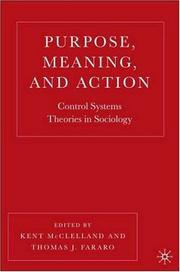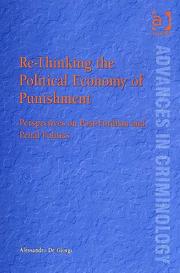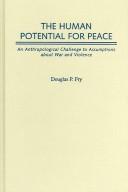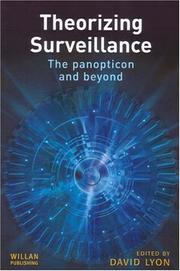| Listing 1 - 10 of 10 |
Sort by
|

ISBN: 1403967989 9781403967985 Year: 2006 Publisher: New York : Palgrave Macmillan,
Abstract | Keywords | Export | Availability | Bookmark
 Loading...
Loading...Choose an application
- Reference Manager
- EndNote
- RefWorks (Direct export to RefWorks)
Control Systems Theory, a newly developing theoretical perspective in the field of sociology, starts from an important insight into human behavior: that people attempt to control the world around them as they perceive it. This volume brings together for the first time the work of all of the most prominent sociologists contributing to the development of this flexible and wide-ranging theoretical paradigm.
Book
ISBN: 9782296017955 2296017959 Year: 2006 Publisher: Paris : Harmattan,
Abstract | Keywords | Export | Availability | Bookmark
 Loading...
Loading...Choose an application
- Reference Manager
- EndNote
- RefWorks (Direct export to RefWorks)
Social control --- Gender identity. --- Sex role. --- Microsociology --- Macrosociology --- Contrôle social --- Identité sexuelle --- Rôle selon le sexe --- Microsociologie --- Macrosociologie --- Sociology --- Gender Studies --- Social Regulation
Book
ISBN: 2802801708 2802804413 9782802801702 Year: 2006 Volume: 108 Publisher: Bruxelles: FUSL,
Abstract | Keywords | Export | Availability | Bookmark
 Loading...
Loading...Choose an application
- Reference Manager
- EndNote
- RefWorks (Direct export to RefWorks)
Depuis la fin de la guerre froide, les politiques de la peur n'ont pas disparu. Au contraire. Leurs sources n'ont cessé de se multiplier, au point d'en faire un des adversaires les plus redoutables des démocraties libérales contemporaines. Certes, comme le rappelle Jean Delumeau, la peur est de tout temps. Si l'affect qu'elle représente connaît son déploiement le plus varié dans le cœur et l'esprit de l'homme, ses formes et ses défis se renouvellent de génération en génération. Aujourd'hui, ses objets et moyens de propagande sont d'une complexité et d'une ampleur inédites. Quant à sa gestion, elle est des plus problématiques : la confiance moderne dans la gestion scientifique des risques et des menaces est fortement ébranlée depuis le milieu du siècle dernier. En sorte qu'il n'est pas exagéré de dire qu'un des enjeux majeurs de nos sociétés est d'assurer en même temps la gestion éclairée des peurs et le contrôle social de ce qui est censé y remédier : les compétences. D'où les deux grands axes d'interrogation pris en charge par les leçons publiques organisées par l'École des sciences philosophiques et religieuses les années académiques 2003-2004 et 2004-2005. Le premier, « De quoi avons-nous peur ? », concerne l'investigation de la spécificité des peurs contemporaines ; le second, « La peur bonne ou mauvaise conseillère ? », a trait aux modes de gestion qui en sont proposés aujourd'hui.
Philosophical anthropology --- Anthropologie socio-culturelle --- Socio-culturele antropologie --- Emotions --- Emotions (Philosophy) --- Rationalism --- Social control --- Emotions (Philosophie) --- Rationalisme --- Contrôle social --- Sociological aspects --- Aspect sociologique --- Contrôle social --- Peur --- Peur collective. --- Bioéthique. --- Aspect politique. --- Bioéthique. --- Philosophy --- peur --- émotion --- religion --- terrorisme --- guerre --- adversaire --- assurance --- sécurité --- société contemporaine --- confiance --- menace terroriste --- biotechnologie --- espoir --- politique de la peur --- précaution --- règle d'engagement --- principe de précaution
Book
ISBN: 2866456181 9782866456184 Year: 2006 Publisher: Paris: Éditions du Félin,
Abstract | Keywords | Export | Availability | Bookmark
 Loading...
Loading...Choose an application
- Reference Manager
- EndNote
- RefWorks (Direct export to RefWorks)
Witchcraft --- Social control --- Power (Social sciences) --- Kinship --- Sorcellerie --- Contrôle social --- Pouvoir (Sciences sociales) --- Parenté --- Social aspects --- Religious aspects --- Aspect social --- Aspect religieux --- Magic --- Africa --- Kings and rulers --- Contrôle social --- Parenté --- Religious aspects. --- Witchcraft - Africa --- Magic - Africa --- Kinship - Africa --- Social control - Africa --- Power (Social sciences) - Africa --- Africa - Kings and rulers --- Pouvoir (sciences sociales) --- Afrique noire --- Anthropologie --- Pouvoir --- Religion --- Politique --- Afrique --- Filiation
Book
ISBN: 2707149241 9782707149244 Year: 2006 Publisher: Paris: La Découverte,
Abstract | Keywords | Export | Availability | Bookmark
 Loading...
Loading...Choose an application
- Reference Manager
- EndNote
- RefWorks (Direct export to RefWorks)
Political persecution --- Social control --- Répression politique --- Contrôle social --- Tunisia --- Tunisie --- Economic policy --- Politics and government --- Politique économique --- Politique et gouvernement --- Economic aspects --- Political history - Economics - Tunisia - Essay - 20th-21st centuries --- Répression politique --- Contrôle social --- Politique économique --- Political history --- Economics --- Essay --- 20th-21st centuries --- Economic policy. --- 1990-.... --- 1987-.... --- 1956-....

ISBN: 0754626105 9780754626107 9781315244273 9781351903547 9781138253957 Year: 2006 Publisher: Aldershot: Ashgate,
Abstract | Keywords | Export | Availability | Bookmark
 Loading...
Loading...Choose an application
- Reference Manager
- EndNote
- RefWorks (Direct export to RefWorks)
Imprisonment --- Prisons --- Punishment. --- Social control. --- Economic aspects. --- Social aspects. --- Convict labor --- Travaux forcés --- Travaux forcés --- Punishment --- Social control --- Peines --- Emprisonnement --- Contrôle social --- Social aspects --- Economic aspects --- Aspect social --- Aspect économique --- Imprisonment - Social aspects. --- Imprisonment - Economic aspects. --- Prisons - Social aspects. --- Contrôle social --- Aspects sociaux --- Aspects économiques

ISBN: 0195181778 0195181786 Year: 2006
Abstract | Keywords | Export | Availability | Bookmark
 Loading...
Loading...Choose an application
- Reference Manager
- EndNote
- RefWorks (Direct export to RefWorks)
In The Human Potential for Peace: An Anthropological Challenge to Assumptions about War and Violence, renowned anthropologist Douglas P. Fry shows how anthropology--with its expansive time frame and comparative orientation--can provide unique insights into the nature of war and the potential for peace. Challenging the traditional view that humans are by nature primarily violent and warlike, Professor Fry argues that along with the capacity for aggression humans also possess a strong ability to prevent, limit, and resolve conflicts without violence. Raising philosophy of science issues, the author shows that cultural beliefs asserting the inevitability of violence and war can bias our interpretations, affect our views of ourselves, and may even blind us to the possibility of achieving security without war. Fry draws on data from cultural anthropology, archaeology, and sociology as well as from behavioral ecology and evolutionary biology to construct a biosocial argument that challenges a host of commonly held assumptions. The Human Potential for Peace includes ethnographic examples from around the globe, findings from Fry's research among the Zapotec of Mexico, and results of cross-cultural studies on warfare. In showing that conflict resolution exists across cultures and by documenting the existence of numerous peaceful societies, it demonstrates that dealing with conflict without violence is not merely a utopian dream. The book also explores several highly publicized and interesting controversies, including Freeman's critique of Margaret Mead's writings on Samoan warfare; Napoleon Chagnon's claims about the Yanomam"o; and ongoing evolutionary debates about whether "hunter-gatherers" are peaceful or warlike. The Human Potential for Peace is ideal for undergraduate courses in political and legal anthropology, the anthropology of peace and conflict, peace studies, political sociology, and the sociology of war and violence. Written in an informal style with nume
Violence --- War --- Peace --- Social control --- Intergroup relations --- Guerre --- Paix --- Contrôle social --- Relations intergroupes --- Conflict [Intergroup ] --- Conflict tussen groepen --- Conflit entre groupes --- Contrôle social --- Groepen--Conflicten --- Groupes--Conflits --- Groups--Conflicts --- Relaties tussen groepen --- Relations [Intergroup ] --- Relations entre groupes --- Intergroup relations. --- Peace. --- Social control. --- Violence. --- War.
Book
ISBN: 2742761098 9782742761098 Year: 2006 Volume: *1 Publisher: Arles: Actes Sud,
Abstract | Keywords | Export | Availability | Bookmark
 Loading...
Loading...Choose an application
- Reference Manager
- EndNote
- RefWorks (Direct export to RefWorks)
A l'heure où, à l'échelle planétaire, la surveillance s'impose comme une condition moderne, Georges Banu en examine le fonctionnement dans de grands textes de théâtre où elle se cristallise autour de dispositifs variés. Dispositifs de surveillance profane qui, d'Hamlet à Tartuffe, de Britannicus au Balcon, réunissent sur le plateau surveillés et surveillants non pas sous l'œil de Dieu, mais sous celui d'un spectateur surinformé. Surveillant privilégié! La mise en scène se trouve prise entre le désir de s'appuyer sur ses techniques anciennes - la table d'Orgon ou la dissimulation de Néron - et la volonté d'intégrer les nouvelles technologies qui le rattachent au présent. A travers "la scène surveillée", se joue l'écartèlement du théâtre entre archaïsme et modernité. Marqué par sa jeunesse sous un régime totalitaire et nourri par son expérience d'homme de théâtre, Georges Banu analyse les formes de la surveillance et les diverses manières dont elle s'exerce sur un plateau, face à un spectateur aux aguets qui en subit tout à la fois l'attrait et l'horreur.
Theater --- Vigilance (Psychology) --- Social control --- Théâtre --- Vigilance (Psychologie) --- Contrôle social --- Censorship --- Production and direction --- Themes, motives --- Censure --- Production et mise en scène --- Thèmes, motifs --- Drama --- Vigilance (Psychology) in literature --- Social control in literature --- History and criticism --- Social control in literature. --- Vigilance (Psychology) in literature. --- History and criticism. --- Théâtre --- Contrôle social --- Production et mise en scène --- Thèmes, motifs --- Drama - History and criticism

ISBN: 0415951399 0415951380 9780415951388 9780415951395 Year: 2006 Publisher: New York: Routledge,
Abstract | Keywords | Export | Availability | Bookmark
 Loading...
Loading...Choose an application
- Reference Manager
- EndNote
- RefWorks (Direct export to RefWorks)
Public spaces --- Democracy --- Social control --- Espaces publics --- Démocratie --- Contrôle social --- Political aspects --- Congresses --- Government policy --- Aspect politique --- Congrès --- Politique gouvernementale --- Geografie --- Sociale geografie --- Politieke Geografie. --- Démocratie --- Contrôle social --- Congrès --- Public spaces - Political aspects - Congresses --- Public spaces - Government policy - Congresses --- Democracy - Congresses --- Social control - Congresses --- 711.61 --- 32 --- 33 --- 911.3:32 --- 911.3:32 Geopolitiek. Politieke geografie --- Geopolitiek. Politieke geografie --- Publieke ruimte --- Openbare ruimte --- Politieke wetenschappen --- Economie

ISBN: 184392191X 1843921928 9781843921912 9781843921929 9781843926818 9781134023592 9781134023660 9781134023738 1134023669 9786612252341 1134023596 1282252348 1843926814 Year: 2006 Publisher: Abingdon: Routledge,
Abstract | Keywords | Export | Availability | Bookmark
 Loading...
Loading...Choose an application
- Reference Manager
- EndNote
- RefWorks (Direct export to RefWorks)
This book is about explaining surveillance processes and practices in contemporary society. Surveillance studies is a relatively new multi-disciplinary enterprise that aims to understand who watches who, how the watched participate in and sometimes question their surveillance, why surveillance occurs, and with what effects. This book brings together some of the world's leading surveillance scholars to discuss the "why" question. The field has been dominated, since the groundbreaking work of Michel Foucault, by the idea of the panopticon and this book explores why this metaphor has been central to discussions of surveillance, what is fruitful in the panoptic approach, and what other possible approaches can throw better light on the phenomena in question.
Privacy, Right of. --- Social control. --- Electronic surveillance. --- Droit à la vie privée --- Contrôle social --- Surveillance électronique --- Privacy, Right of --- Social control --- Electronic surveillance --- Surveillance --- Surveillance. --- Droit à la vie privée --- Contrôle social --- Surveillance électronique --- Social conflict --- Sociology --- Liberty --- Pressure groups --- Invasion of privacy --- Right of privacy --- Civil rights --- Libel and slander --- Personality (Law) --- Press law --- Computer crimes --- Confidential communications --- Data protection --- Right to be forgotten --- Secrecy --- Electronics in surveillance --- SIGINT (Electronic surveillance) --- Signals intelligence --- Surveillance, Electronic --- Remote sensing --- Law and legislation
| Listing 1 - 10 of 10 |
Sort by
|

 Search
Search Feedback
Feedback About UniCat
About UniCat  Help
Help News
News